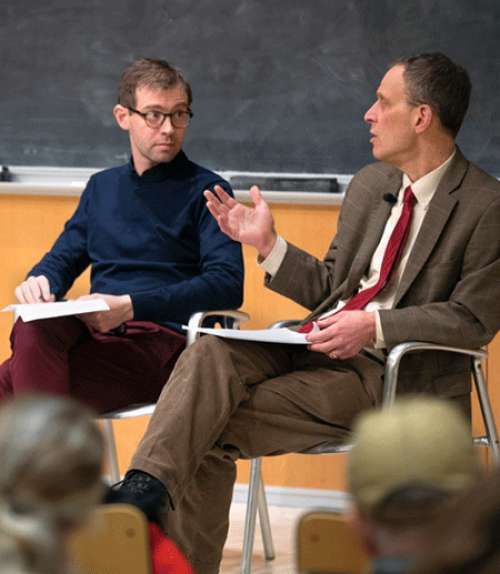As the impeachment trial of President Donald Trump unfolds in the U.S. Senate, followed live by people across the country and around the world, two Cornell professors offered their perspectives on the event and what it says about the current state of American politics.
In the panel discussion “The Law and Politics of Impeachment,” Jan. 29 in the Physical Sciences Building, Sarah Kreps, professor of government in the College of Arts and Sciences, and Michael Dorf, the Robert S. Stevens Professor of Law at Cornell Law School, looked beyond the daily details of the trial to consider the causes and ramifications of the Trump impeachment.
David Bateman, assistant professor of government in the College of Arts and Sciences, moderated the event, sponsored by Cornell’s Institute of Politics and Global Affairs.
Kreps, an international relations expert, situated the impeachment in the context of American foreign policy. She said the two articles of impeachment against Trump are both tied to strategic military aid to a country that 84% of Americans, as of a 2014 survey, couldn’t find on a map.
“Why Ukraine?” she said. “The metaphor I came up with, a historical analogy, was Al Capone.”
The Chicago crime boss Capone, she said, did “a lot of things that seemed sinister,” but was eventually prosecuted, in 1931, on narrow charges of tax evasion. Likewise, she said, Democratic legislators of the House of Representatives find a “litany of things” wrong with the Trump administration, but in the end issued narrow articles of impeachment based on his dealings with Ukraine.
Dorf, a constitutional scholar, sees increasing partisan politics at work in the Trump impeachment trial, potentially threatening the separation of powers.
“Our constitution was written by people who neither expected nor wanted there to be political parties,” he said. “What you’re seeing now is that the Senate has a Republican majority, so they’re closely aligned with the president, and they are serving the interest of the Republican party as an institution, rather than [of] the Senate.”
Dorf thinks the current high degree of political polarization is a “logical end point of a party system,” something the framers of the Constitution feared.
“We’ve reached Hamilton’s and Madison’s nightmare,” he said, “in that the party system has taken over the separation of powers system.”
Bateman, whose research focuses on Congress, agreed, saying Senate Majority Leader Mitch McConnell, a Republican from Kentucky, has said his role in the impeachment trial is to back the president.
“Once you have that type of relationship,” Bateman said, “the idea that the branches will check each other strikes me as fantastic.”
There is consensus, Kreps said, that the executive branch has gained power, particularly in the current administration. She wondered: Could the Trump impeachment trial check this power?
“If anything, I think it puts on notice the executive branch that there is a more watchful eye than there has been,” she said. “Whether that has staying power, time will tell.”
Read this article in the Cornell Chronicle.




